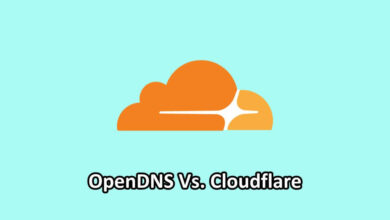DNS Vs IP : A Side-by-Side Comparison [2024]
When we think about the internet, two acronyms immediately come to mind: DNS and IP. These fundamental components play a crucial role in how we access websites, send emails, and communicate online. In this blog, I’ll walk you through the significance of DNS (Domain Name System) and IP (Internet Protocol) and how they work together to make the Internet a global network.
In this article, we will help you understand the complete difference between DNS and IP with the help of a comparison table.
DNS Vs. IP (A Comparison)
| DNS | IP |
|---|---|
| DNS is a system that translates user-friendly domain names (e.g., www.example.com) into numerical IP addresses, making it easier for humans to access websites on the internet. | IP is a fundamental communication protocol that governs the routing of data packets across the internet. |
| DNS deals with domain names, translating user-friendly domain names into IP addresses. | IP is responsible for packet routing and ensuring data reaches its destination across the internet. |
| DNS is designed for humans, providing a convenient way to access websites using domain names. | IPs are primarily designed for machine-to-machine communication, routing data packets between devices. |
| It follows a hierarchical structure with top-level domains, subdomains, and hostnames. | IP addresses are more straightforward numerical values. |
| DNS remains consistent, serving its role. | IP has evolved from IPv4 to IPv6. IPv4 uses 32-bit addresses, limiting available addresses, while IPv6 uses 128-bit addresses, enabling a vast number of unique IPs. |
Understanding DNS (Domain Name System)
What is DNS
DNS, or the Domain Name System, is like the phonebook of the internet. It translates human-friendly domain names (e.g., www.example.com) into machine-readable IP addresses (e.g., 203.0.113.1). This translation is vital because it allows us to access websites and services using easily memorable domain names rather than numeric IP addresses.
The DNS system is distributed globally, with numerous DNS servers that store these mappings. When you type a URL into your browser, your computer contacts a DNS server to resolve the domain name, fetching the corresponding IP address so that you can connect to the website.
The Role of Domain Names in DNS
Domain names are the familiar, user-friendly labels that make the internet accessible. They serve as an alias for IP addresses, making it convenient for users to navigate the web. Behind the scenes, domain names are organized hierarchically, with top-level domains (TLDs), like .com or .org, at the highest level. Subdomains and specific hostnames are used to pinpoint precise locations on the internet.
Domain names have become essential for branding, marketing, and ensuring a memorable online presence. They’re more than just addresses; they’re an integral part of how we identify websites and services.
Understanding IP (Internet Protocol)
What is IP?
Internet Protocol, or IP, is the protocol that governs how data packets are routed across the internet. It ensures that data gets from one device to another, regardless of their locations. IP addresses are unique identifiers assigned to each device connected to the internet, much like a home address in the physical world.
IP is responsible for data packet delivery, including email, web browsing, and video streaming. It provides a way to route data through a complex network of interconnected devices, making sure it reaches its intended destination.
Differentiating IPv4 and IPv6
IPv4 and IPv6 are two versions of the Internet Protocol, with IPv4 being the older, more widely used version. IPv4 uses 32-bit addresses, limiting the number of available IP addresses.
On the other hand, IPv6 uses 128-bit addresses, offering an almost infinite pool of addresses. The transition to IPv6 is necessary to accommodate the growing number of internet-connected devices and ensure the longevity of the internet.
The Format of IP Addresses
IP addresses come in two flavors: IPv4 addresses look like “192.168.0.1,” while IPv6 addresses are more complex, such as “2001:0db8:85a3:0000:0000:8a2e:0370:7334.” Each IP address provides information about the network and host, allowing routers to make decisions about where to send data packets.
IP addresses are essential for routing data, maintaining security, and enabling devices to communicate across the internet.
Key Differences Between DNS and IP
In our exploration of DNS and IP, it’s crucial to highlight the key differences between these two fundamental components of the Internet:
- Function: DNS deals with domain names, serving as a directory to translate user-friendly domain names into IP addresses. In contrast, IP is responsible for packet routing and ensuring data reaches its destination across the internet.
- Human vs. Machine: DNS is primarily designed for humans, providing a convenient way to access websites using domain names. IP, on the other hand, is all about machine-to-machine communication, as it routes data packets between devices.
- DNS Hierarchical Structure: DNS follows a hierarchical structure with top-level domains, subdomains, and hostnames. IP addresses are more straightforward numerical values.
- IP Version: DNS remains consistent in its role, but IP has evolved from IPv4 to IPv6. IPv4 uses 32-bit addresses, limiting the number of available addresses, while IPv6 uses 128-bit addresses, enabling a vast number of unique IPs.
Future Trends and Conclusion
The world of DNS and IP is continually evolving. Emerging technologies like DNS over HTTPS (DoH) and DNS over TLS (DoT) are enhancing security and privacy in DNS queries. These technologies encrypt the DNS traffic, making it harder for third parties to intercept and analyze.
In the realm of IP, the transition to IPv6 is a prominent trend. As the number of internet-connected devices skyrockets, the transition to IPv6 is essential to ensure that we have enough unique IP addresses to support this growth. Moreover, the Internet of Things (IoT) is fueling the demand for IP addresses, emphasizing the need for IPv6.
The Ongoing Importance of DNS and IP
In conclusion, DNS and IP are the unsung heroes of the internet. While they often operate behind the scenes, they are the backbone of how we navigate the web and communicate online. As technology continues to advance, understanding these core concepts remains crucial.
DNS ensures that we can access our favorite websites with ease, while IP enables data to traverse the globe and connect billions of devices. As we move into the future, embracing emerging trends and ensuring the seamless coexistence of DNS and IP will be essential for a thriving digital world.
In a rapidly changing digital landscape, keeping up with DNS and IP developments and their integration into new technologies is essential to stay ahead in the ever-evolving internet realm. These foundational components will continue to shape our online experiences and deserve our attention and appreciation.
FAQs about DNS vs IP
What is the Main Difference Between DNS and IP?
The main difference between DNS (Domain Name System) and IP (Internet Protocol) is their function. DNS is a system that translates user-friendly domain names (e.g., www.example.com) into machine-readable IP addresses (e.g., 203.0.113.1). In contrast, IP is responsible for routing data packets across the internet, ensuring they reach their intended destination.
Should IP and DNS Be the Same?
No, IP and DNS should not be the same. They serve different purposes in internet communication. DNS is used for human convenience to access websites using domain names, while IP is used for routing data between devices on the internet. While there might be some correlation between DNS and IP for a specific website or service, they are distinct concepts.
Does Every IP Have a DNS?
No, not every IP address has a corresponding DNS (Domain Name System) entry. While most websites and services have DNS records that map domain names to IP addresses, individual IP addresses used within a private network or for various purposes might not have a DNS entry associated with them. DNS records are typically used for public-facing websites and services.
Give an Example of DNS and IP.
An example of DNS and IP is as follows:
DNS: Domain Name – www.google.com
IP: IPv4 Address – 172.217.3.110
In this example, when you type “www.google.com” in your web browser, the DNS system translates it into the corresponding IPv4 address (172.217.3.110), allowing your device to connect to Google’s servers on the internet.



